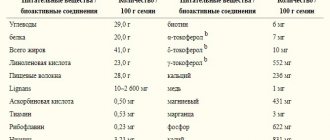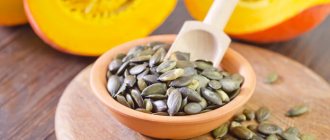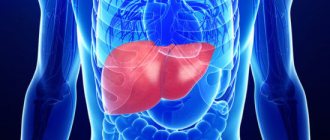Back to list Previous article Next article
21.06.2021
Tags:
useful, flax seeds
5/5 — (1 vote)
Flaxseed is a plant food that contains healthy fats, antioxidants, and fiber. Some call it a "functional food." This means that a person can use it to improve their health.
People grew flax as a crop in ancient Egypt and China. In Asia, it has been used in Ayurvedic medicine for thousands of years.
Today, flaxseed is available in the form of seeds, oil, powder, tablets, capsules and flour. People use it as a dietary supplement to prevent constipation, diabetes, high cholesterol, heart disease, cancer and several other diseases.
Nutrients in flaxseed include:
- lignans,
- antioxidants,
- fiber,
- protein and polyunsaturated fatty acids such as alpha-linolenic acid (ALA), or omega-3.
Consuming these nutrients can help reduce your risk of developing various diseases.
However, there is currently insufficient evidence to support all of these hypotheses. Let's look at what research says about flaxseed and its possible benefits.
Possible beneficial properties of flax
Flaxseed contains several nutrients that may have various health benefits.
Like other plant foods, flaxseed is rich in antioxidants. They can help prevent disease by removing molecules called free radicals from the body. They arise as a result of natural processes and environmental influences. If there are too many free radicals in the body, oxidative stress can develop, which leads to cell damage and disease. Antioxidants help remove free radicals from the body.
Flaxseed is a good source of lignans, which have antioxidant properties. According to some scientists, flaxseed may be more than 800 times richer in lignans than most other foods.
The following sections take a closer look at the possible benefits of flaxseed.
Reducing the risk of cancer
Flaxseed contains omega-3 fatty acids. Research shows that they may help prevent the growth of various types of cancer cells. One 2013 study found a lower incidence of breast cancer among women who regularly consumed flaxseed.
Additionally, in 2021, the review authors concluded that flaxseed may help reduce the risk of developing breast cancer after menopause.
Lignans are a type of phytoestrogens, which are plant-derived nutrients that act similarly to estrogen. There was previously concern that phytoestrogens might increase the risk of breast cancer, but recent research suggests they play a protective role.
Normalize cholesterol levels and improve heart health
The American Heart Association (AHA) recommends eating more fiber and omega-3s to promote heart health. Lignans may also help prevent cardiovascular disease. Flaxseed contains all of these nutrients.
Flaxseed also contains phytosterols. They are similar in structure to cholesterol, but they help prevent cholesterol from being absorbed in the intestines.
Therefore, consuming phytosterols may help lower the levels of low-density lipoprotein (LDL), or “bad” cholesterol, in the body.
In 2010, researchers studied the effect of flaxseed on cholesterol levels in men. Participants took a 20 mg lignan capsule, a 100 mg capsule, or a placebo for 12 weeks. After taking lignans, cholesterol levels decreased, especially in those who took the 100 mg capsules.
Researchers in a 2012 study of 17 people found that eating flaxseed lowered cholesterol and helped the body eliminate fat, although they noted that overall diet may also play a role. A team of researchers suggested that flaxseed may be beneficial for lowering cholesterol levels.
Some scientists have also linked omega-3 oils, commonly found in fatty fish, to reduced cardiovascular risk. The researchers suggested that flaxseed could provide an alternative to marine sources of omega-3s.
Relieving Arthritis Symptoms
According to the Arthritis Foundation, flaxseed may help reduce joint pain and stiffness . Some people take it for rheumatoid arthritis, lupus, and Raynaud's phenomenon.
Reducing hot flashes
In 2007, a group of scientists published results suggesting that flaxseed may help reduce the frequency or severity of hot flashes in women not using estrogen therapy during menopause.
However, in 2012, following further research, the same group of scientists concluded that flaxseed actually had no effect.
Increased blood sugar levels
Lignans and other phytoestrogens may help reduce the risk of developing chronic diseases such as diabetes.
In 2013, scientists gave 25 people 0g, 13g, or 26g of flaxseed every day for 12 weeks. Participants had prediabetes and were either obese or overweight men or women who had experienced menopause.
The 13 g dose was found to reduce glucose and insulin levels and improve insulin sensitivity, while other doses had no such effect.
Additionally, a 2021 study in rodents found that compounds found in flaxseed may help reduce the incidence of type 1 diabetes and delay the onset of type 2 diabetes. However, these results may not apply to humans.
That same year, 99 people with prediabetes took 40g or 20g of flaxseed or no flaxseed and a placebo every day for 12 weeks. Eating flaxseed was found to lower blood pressure, but did not improve blood sugar levels or insulin resistance.
The benefits of flaxseed for diabetes symptoms remain unclear.
Preventing constipation
Flaxseed is a good source of insoluble fiber, which does not dissolve in water but remains in the digestive tract after eating. There it absorbs water and expands in volume, which can facilitate regular food intake.
However, the National Center for Complementary and Integrative Health (NCCIH) says there is little evidence that flaxseed helps relieve constipation.
The NCCIH adds that eating flaxseed with a little water can worsen constipation and lead to intestinal blockage.
Additionally, too much flaxseed or flaxseed oil can cause diarrhea.
Reducing exposure to radiation
In 2013, scientists found evidence that dietary lignans from flaxseed help mice recover from radiation exposure.
Rodents that consumed lignans had lower levels of organ inflammation, oxidative damage and fibrosis, as well as higher survival rates compared to those that did not consume them.
If further human trials show similar results, flaxseed lignans could help treat lung problems after radiation or radiotherapy.
Other diseases
currently funding research to find out if the nutrients found in flaxseed can help with:
- ovarian cancer;
- cardiovascular diseases;
- metabolic syndrome
- diabetes;
- asthma;
- inflammation of organs.
Uses of flaxseed in Ayurvedic medicine include:
- strengthening general health;
- restoration of skin pH balance;
- prevention of chronic diseases such as diabetes, atherosclerosis and arthritis;
- providing protection against cancer.
General information about constipation
Constipation is a condition in which bowel movements occur less than three times a week. In addition to prolonged absence of bowel movements, a person experiences a deterioration in general health, headaches, and abdominal discomfort. When bowel movements occur, compaction of the stool and the release of fragmented feces are observed. Often the stool is scanty, and after defecation there remains a feeling of incomplete emptying. The condition is often accompanied by hemorrhoids.
Pathology can develop in patients of all ages; with age, the risk of developing a pathological condition increases. This problem is often observed in pregnant women. Constipation can occur against the background of organic or functional pathologies of the digestive tract, helminthic infestations, and the presence of neoplasms in the body. In the absence of any diseases, the cause of its development is an unbalanced diet, a sedentary lifestyle, dehydration, stress (for example, a change in environment), and often a combination of these factors occurs.
In many cases, the solution to the problem is changing lifestyle - correcting nutrition, maintaining a moving, active lifestyle, and adequate drinking regimen. Medicines, physical therapy, and massage can also be used for treatment.
Nutritional value of flaxseed
According to the USDA, a 7-gram tablespoon of ground flaxseed contains:
- energy: 37.4 calories
- protein: 1.28 g
- fat: 2.95 g
- carbohydrates: 2.02 g
- fiber: 1.91 g
- calcium: 17.8 mg
- magnesium: 27.4 mg
- phosphorus: 44.9 mg
- potassium: 56.9 mg
- folate: 6.09 micrograms (mcg)
- lutein and zeaxanthin: 45.6 mcg
A teaspoon of flaxseed also contains traces of various vitamins and minerals, but not in significant quantities. It also contains lignans, tryptophan, lysine, tyrosine and valine, as well as healthy fats, mostly unsaturated.
People should try to avoid whole flaxseed and consume it in ground form, as the intestines may not be able to absorb the nutrients contained in whole flaxseed.
How to take flaxseed for medicinal purposes for constipation
If you have difficulty defecating, you can use medicines made from flax seeds, prepared according to the following recipes:
| Name | Recipe/Features | How to use |
| Infusion | To prepare, take 1 tablespoon of raw material, brew with 2 cups of boiling water, leave in a thermos for 8 hours and strain. | Adult patients drink 100 ml of infusion 3 times a day before meals, children over 7 years old - 50 ml 5 times a day. |
| Decoction | It helps even with severe constipation. 1 tablespoon of raw material is poured into 1 liter of boiling water, cooked over low heat under a lid for 1 hour, stirring occasionally. Remove the broth from the heat, allow it to cool and filter. | Drink for adults 1 glass 4 times a day, for children 7 years and older 0.5 cup 4 times a day. |
| Pure seeds | No cooking required. The product helps well with motility disorders and/or mild constipation, in which incomplete bowel movements are noted. | Eat in the morning on an empty stomach, chewing well, 1 tablespoon (adults) or 1 teaspoon (children 2 years and older) of seeds. Flax seeds should not be given to children under 2 years of age. |
| Seeds with kefir | Add 1 teaspoon of crushed (for example, ground in a coffee grinder) flax seeds to a glass of kefir. For children, 0.5 teaspoon of raw material is dissolved in 1 glass of kefir. The product helps well with delayed bowel movements in older people. | Drink in the morning on an empty stomach. |
| Infusion from a mixture of medicinal plants | Prepared from equal parts of flaxseed, chamomile, thyme, tansy, bearberry, coriander. Pour two tablespoons of the resulting mixture into 400-500 ml of boiling water, allow the product to cool, and filter. | Take 1/3 cup per day. The course of treatment with infusion is usually about 1 month. |
Risks
The nutrients contained in flaxseed may not be beneficial for everyone. People should avoid flaxseed products or consult a doctor first if they:
- use blood thinners such as warfarin (Coumadin) or aspirin;
- use non-steroidal anti-inflammatory drugs;
- take cholesterol-lowering medications;
- have hormone-sensitive breast or uterine cancer;
- are pregnant or breastfeeding;
- suffer from an allergy to flaxseed.
In general, people who eat flaxseed should avoid raw and unripe flaxseeds, as they may contain toxic compounds. Consume flaxseed ground and with plenty of liquid to prevent digestive problems.
Buy only small bottles of flaxseed oil in dark bottles and store them in the refrigerator, as the oil can spoil quickly. Also, do not use oil after the expiration date stated on the label.
Avoid heating flaxseed oil when cooking. Add oil to already prepared dishes and do not heat it in the microwave.
Flax seeds and contraindications for their use
In addition to pancreatitis, cholecystitis, and exacerbation of inflammatory diseases of the mucous membranes of the digestive organs, lactation may be a contraindication. The nutrition of a nursing mother should be selective and careful. You should not introduce new products, especially if your baby has had allergies. Sometimes allergies also occur to flax seeds. Those whose children are allergic to nuts are especially at risk. It is best to exclude flax seed for the entire lactation period. However, according to other sources, the product is hypoallergenic and should not be removed from the diet when feeding a child. One way or another, you need to consult with your doctor, pediatrician and allergist.
Diet Tips
Flaxseed can be consumed ground, in oil form, or in capsules.
It is also found in ready-to-eat foods such as muffins and other baked goods, pasta, snack bars and alternative milks.
Ground flaxseed can be added to:
- breakfast cereals,
- smoothie,
- soups and stews,
- salads and sandwiches,
- yoghurts.
You can also add a spoonful of flaxseed to the muffin mixture or use it to coat chicken instead of breadcrumbs.
However, too much flaxseed can give the food a bitter taste, which some people may not like. One solution is to start with a small amount and gradually add to taste.
Recommendations
In order for flaxseed-based products to bring only benefits, you need to prepare and use them correctly:
- Purchase seeds whole and grind them yourself, immediately before use. Ground flax can only be purchased in vacuum packaging, otherwise the product quickly loses its beneficial properties.
- The crushed raw material must be washed down with a sufficient amount of water, which is necessary for its swelling, otherwise the effectiveness of the product is significantly reduced.
- Flax seeds can be added to fermented milk products (kefir, yogurt, yogurt), as well as first courses, porridge made from buckwheat, oatmeal, and corn.
- Flaxseed infusion (jelly) can be sweetened with honey.
Flax seeds are often consumed, poured with kefir - the result is a tasty and healthy dietary drink
Can flaxseed oil be used in cooking or in salads?
Flaxseed oil can be used in cooking as long as it is not heated. It is best to add it to already prepared dishes and not heat it in the microwave. This is because heating the oil causes it to break down into a potentially harmful form. Flaxseed oil can be used to make salad dressings, but it can quickly go bad. Store it in the refrigerator in a dark-colored bottle and do not use it after the expiration date.
Back to list Previous article Next article











